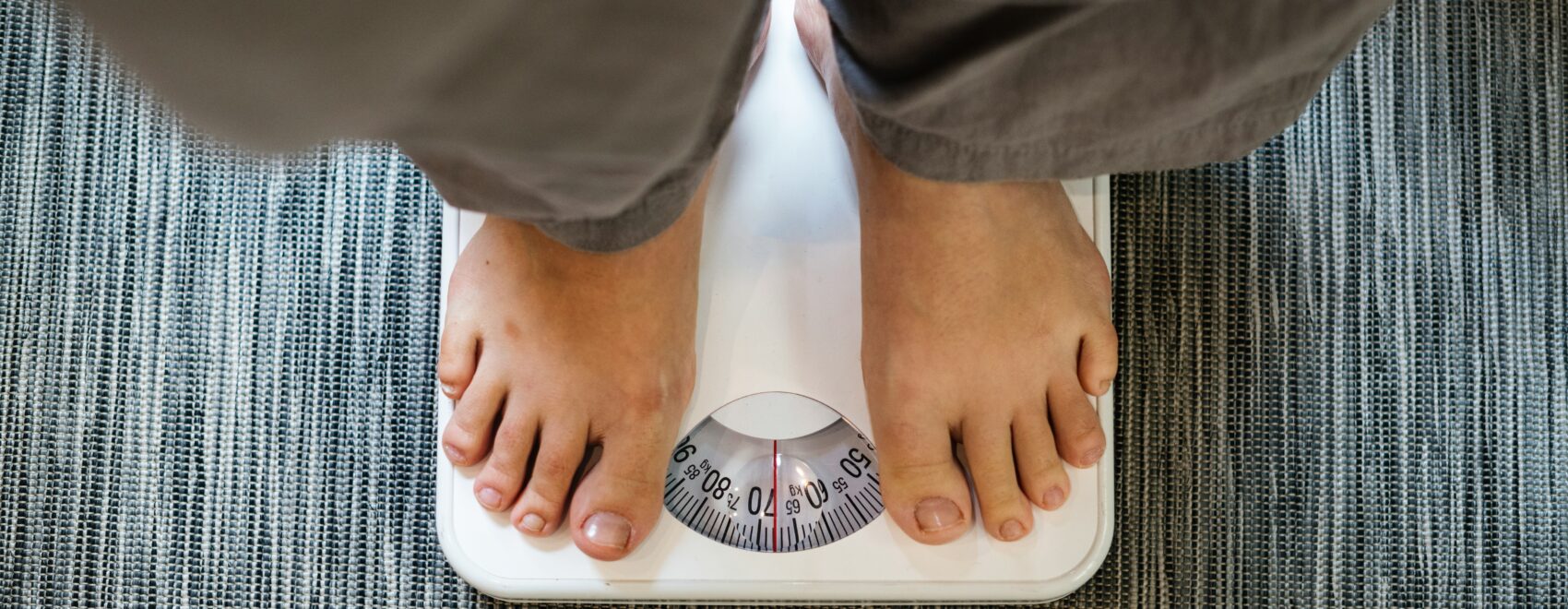You’re eating the same and working out like usual. But once you hit your 40s your clothes start feeling tighter. And that number on the scale? It keeps creeping up. If this sounds familiar, you’re not alone. For 60-70% of women, menopause and weight gain go hand in hand.1
Hormonal shifts, aging, and midlife stress can all make it harder to manage your weight. While weight loss is often trickier during menopause—it is possible. With a few simple diet and lifestyle shifts, you can prevent menopause weight gain from getting out of hand and feel good in your body again. Keep reading for the inside scoop on why menopause weight gain happens, and what you can do to stop it.
What Causes Menopause Weight Gain?
When it comes to menopause and weight gain, hormones often get all the blame. And while that’s partly true, it’s far more nuanced than that. Here’s what I mean.
Once menopause hits, estrogen and progesterone take a steep drop. And as estrogen dips, it shifts where your body stores fat. During perimenopause (the 5 to 10-year transition before menopause), most women collect fat on their hips and thighs. But as estrogen declines, women start to store more fat around their midsection.
This is sometimes referred to as “menopause belly” or “menobelly, ” and it’s bad news for your health. Excess belly fat increases the risk of many health conditions including heart disease and type 2 diabetes.2
Aging is another huge culprit behind menopause weight gain. Your body loses muscle as you age. Since muscle burns more calories than fat, this leads to a slower metabolic rate. That’s why you may notice an uptick in your weight—even though you haven’t changed your diet or exercise routine.
Menopause symptoms can also shift your lifestyle habits, which may contribute to weight gain. You may become more sedentary due to fatigue or poor sleep (hello night sweats). Or you may stress eat or make poor food choices due to mood swings or sheer overwhelm. On top of that, some medications used for menopause symptoms, like antidepressants, are linked with weight gain.3
Hormonal changes aside, midlife can be a stressful time. Between work demands, financial pressures, parenting, and caring for aging parents—it’s a lot to juggle. And when stress is high and schedules are packed, it’s much easier to let healthy habits slide.
Does Menopause Weight Gain Stop?
First off, not all women gain weight during menopause. However, many do. On average, women gain around one pound per year during the menopause transition.4 Not a ton—but it does add up.
But you’ll be happy to hear it does stabilize over time.5 Most weight gain happens during perimenopause and the first two years after the last menstrual cycle. From there, it tends to level off.
So if you’re approaching menopause and finding it harder to manage your weight—you’re not imagining things. The good news? By tweaking your diet and lifestyle, you can maintain a healthy weight in menopause and beyond.
How to Prevent Menopause Weight Gain
Unfortunately, there isn’t any quick fix for how to stop menopause weight gain. But eating a menopause-friendly diet and shifting your daily habits can make a big difference.
Here are eight natural ways to combat menopause weight gain:
Clean up your diet

Processed foods, refined carbs, and sugary treats can drive inflammation, spike blood sugar, and lead to weight gain—especially in menopause. Instead, focus on whole, nutrient-dense foods that support a healthy metabolism. Think lean proteins, fiber-rich veggies, healthy fats, and antioxidant-packed fruits.
A Mediterranean-style diet is a great guide. Also, be mindful of alcohol—it can disrupt hormones, slow metabolism, and make it harder to manage your weight. If you’re feeling lost on what to eat, stay tuned. I’ll share an excellent resource at the end of this post.
Eat more protein
After age 30, women can lose as much as 3 to 5% of muscle per decade, which affects metabolic rate.6 And what does your body need to preserve and build muscle? You guessed it—protein. That’s why one of the best ways to stave off age-related muscle loss is to increase your protein intake.7 Remember: muscle burns more calories than fat.
Shooting for 25 to 30 grams of protein per meal is a good rule of thumb. Here are some high-protein foods to consider adding to the mix:
- Animal protein sources: wild salmon, sardines, grass-fed beef, organic chicken and turkey, pasture-raised eggs, collagen peptides, bone broth protein powder, Greek yogurt, cottage cheese
- Plant protein sources: lentils, beans, quinoa, edamame, organic tofu, tempeh, nuts, seeds, nut butter, pea protein, & hemp protein
Trim your calories
The key to weight loss is to create a calorie deficit—to burn more calories than you consume. But no need for fad diets or juice cleanses. Instead, focus on mindful eating. Try reducing mindless grazing, late-night snacking, and empty calories like alcohol. A simple trick? Eat until you’re 80% full. It takes about 20 minutes for your brain to sense fullness. So eating slowly can help prevent overeating.
Move more

Exercise is a game-changer during menopause. It burns calories, supports heart health, and helps ease symptoms like mood swings, fatigue, and insomnia. Aim for at least 150 minutes of movement per week, but don’t stress about doing it all at once. Struggling to fit workouts in? Think outside the box—take the stairs, try a standing desk or walking pad, or squeeze in movement breaks throughout the day. Every bit adds up!
Add strength training

Strength training, or resistance training, is a must during menopause. It helps build lean muscle, which is crucial for preventing age-related muscle loss. Muscle improves your metabolic rate—even when you’re at rest. So, by building muscle, you can boost your metabolism and keep menopause weight gain in check.
Not sure where to start? You don’t need a fancy gym membership. Dumbbells, kettlebells, resistance bands, or medicine balls can all help you strength train from home. Bodyweight exercises like squats, lunges, planks, and push-ups also do the trick. You can even join fitness classes like Pilates or Barre, which are great for building lean muscle.
Optimize sleep habits
Night sweats, insomnia, and other menopause symptoms can interfere with your sleep. And poor sleep can throw off stress and hunger hormones and contribute to weight gain.8 That’s why good sleep hygiene is key for perimenopause and menopause.
Here are some tips to improve your sleep quality:
- Keep a consistent sleep schedule: Go to bed and wake up at the same time every day.
- Lower the thermostat: Turn it down a few degrees before bed to keep your room cool.
- Avoid caffeine after 3 pm: It can interfere with falling asleep.
- Steer clear of electronics: Avoid screens 1-2 hours before bed to prevent blue light from disrupting your sleep cycle.
- Wear lightweight sleepwear: Choose breathable fabrics to prevent overheating.
- Use a fan: Keep one on your nightstand to cool off if night sweats hit.
Keep stress in check

Menopause brings a mix of symptoms like hot flashes, memory changes, and anxiety. These can be overwhelming and lead to stress eating or feeling unmotivated to exercise. Managing stress can help you avoid these pitfalls and maintain healthy habits during this transition.
Mindfulness practices like meditation, mindful eating, and yoga can help keep stress at bay. Or try some vagus nerve exercises to trigger your body’s relaxation response. Getting out in nature, journaling, and making time for fun can also ease stress and boost your well-being.
Address other menopause symptoms
As mentioned, menopause symptoms can make it harder to stick to a healthy lifestyle. Tackling these symptoms head-on can make it easier to stay on track with your diet and exercise routine.
At Anchored in Health, we take a holistic approach to menopause weight gain. We cover all the bases, including nutrition, lifestyle, and holistic treatments. One treatment we offer is bioidentical hormone replacement therapy (BHRT).
BHRT can help ease menopause symptoms like hot flashes and mood swings.9 While it doesn’t boost weight loss, it can take the edge off and make it easier to keep healthy habits—which can, in turn, lead to weight loss.
Since hormones vary widely from person to person, it’s important to test first to find the right protocol for you. That’s why our functional medicine doctor uses DUTCH testing to get a full picture of your hormone health.
Getting an in-depth look at your hormones allows treatment to be personalized to your unique needs. Instead of one-size-fits-all protocols, you get a targeted plan tailored just for your body.
Struggling with Menopause Weight Gain? Lose Weight with Shape ReClaimed in Orland Park, IL
Menopause weight gain can feel like an uphill battle. But with the right approach, you can take back control. The key isn’t a crash diet or a magic pill—it’s a sustainable, anti-inflammatory lifestyle that works with your body, not against it.
That’s exactly what Shape ReClaimed offers. This guided program helps you reset your metabolism, reduce inflammation, and lose weight the healthy way.
Live in the Chicago area and ready to break free from menopause weight gain? Follow these steps:
- Contact us to speak with our holistic functional medicine doctor.
- Book your first Shape ReClaimed appointment at Anchored in Health here.
- Take back control of your health and your weight with this healthy lifestyle transformation plan!
Other Holistic Services Offered at Anchored in Health in Orland Park, IL.
Anchored in Health offers holistic medicine in the Chicago area to support your health–at every stage of life. We provide a wide range of services including chiropractic care, functional medicine, acupuncture, and massage therapy. Vibrant wellness testing, thermography, and genetic testing are also offered to get to the root of imbalances.
If you’re looking for natural solutions for menopause symptoms or weight management, we’re here to help. Visit our blog for more health tips. We look forward to supporting you!
Disclaimer: The information provided on this blog is for educational and informational purposes only and is not intended to diagnose, treat, cure, or prevent any disease. The content is not a substitute for professional medical advice, diagnosis, or treatment. Always seek the guidance of a qualified healthcare provider with any questions you may have regarding your health or a medical condition.
Reading this blog does not establish a doctor-patient relationship between you and Anchored In Health or any of its practitioners. Reliance on any information provided in this blog is solely at your own risk. For medical concerns, always consult a licensed healthcare provider.
Sources:
- Sleep and Sleep Disorder in the Menopause Transition | Sleep Medicine Clinics
- The Reality of Menopause Weight Gain | Mayo Clinic
- Weight Gain and Antidepressants | Pubmed
- Weight Regulation in Menopause | Pubmed
- Changes in Body Composition and Weight During the Menopause Transition | Pubmed
- Preserve Your Muscle Mass | Harvard Health Publishing
- Weight Gain During the Menopause Transition: Evidence for a Mechanism Dependent on Protein Leverage | Pubmed
- Sleep Deprivation: Effects on Weight Loss and Weight Loss Maintenance | Pubmed
- Effectiveness of Compounded Bioidentical Hormone Replacement Therapy | Pubmed
